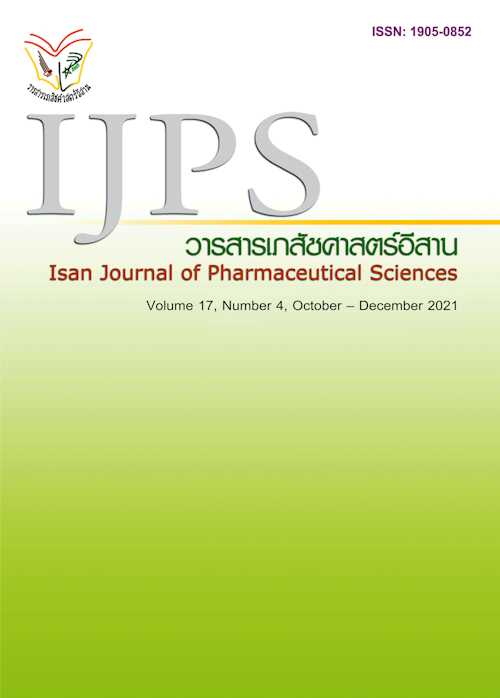Clinical outcomes and cost saving of oncology pharmacy interventions on cancer patient care by pharmacists
Main Article Content
Abstract
Recently, the role of pharmacists in providing pharmaceutical care has contributed to the successful treatment, reducing drug side effects and resulting in treatment related cost savings. This research aimed to evaluate clinical outcomes and cost-saving from oncology pharmacy interventions by chemotherapy preparation unit pharmacist. Method: A retrospective observational study was conducted on cancer patients receiving chemotherapy at the radiotherapy and chemotherapy center, Khon Kaen Hospital, Khon Kaen, Thailand, from May 1, 2020, to April 30, 2021. Data were retrieved from patient medical records or patients’ electronic databases, including the patient’s demographic information, drug-related problems, and records of pharmacists’ intervention. Descriptive statistics were used to describe clinical outcomes. In addition, the cost-saving were analyzed according to the cost of prevention chemotherapy discrepancies. Results: During the one year period, 56,858 chemotherapy items from 11,129 prescriptions were screened with problems identified in 138 patients, mostly female (63%), with a mean age of 55.8 ± 12.9 years. The most common cancer diagnosed was breast cancer (n=25, 18.1%). Pharmacists intervened in 150 DRPs (1.3 %) of which 126 (84%) DRPs were medication errors (MEs) and 24 DRPs (16%) were adverse drug reactions (ADRs). The most common MEs were unclear written prescriptions (n= 76, 50.7%). The most common adverse reactions were side effects of chemotherapy (n=17, 11.3 %), including nausea and vomiting (n=6, 4%), alopecia (n=4, 2.7%). Pharmacists’ intervention by managing DRPs were mostly (n= 142, 94.7%) accepted by the healthcare team, resulting in problems resolved. Pharmacists' interventions enable patients to receive chemotherapy medications appropriately to prevent and reduce the severity of adverse reactions. In addition, the pharmacist’s interventions led to cost savings of 164,538 THB from preventing inappropriate chemotherapy preparation. Conclusion: Oncology pharmacy interventions by chemotherapy preparation unit pharmacists successfully prevented medication errors and managed adverse drug events. These interventions also resulted in cost savings ensuring positive economic value.
Article Details
In the case that some parts are used by others The author must Confirm that obtaining permission to use some of the original authors. And must attach evidence That the permission has been included
References
American Society of Hospital Pharmacists. ASHP Guidelines on Preventing Medication Errors with Chemotherapy and Biotherapy. Am J Hosp Pharm. 2015; 72:e6-35.
Ashokkumar R, Srinivasamurthy S, Kelly JJ, Howard SC, Parasuraman S, Uppugunduri CS. Frequency of chemotherapy medication errors: A systematic review. J Pharmacol Pharmacother. 2018; 9:86-91
Choorassamee J. Medication Errors and Adverse Drug Events in Patients Receiving Antineoplastic Agents. ThaiJ Pharm Practice. 2019; 4(11): 743-53. (in Thai)
Han JM, Ah YM, Suh SY, Jung SH, Hahn HJ, Im SA, et al. Clinical and economic impact of pharmacists’ intervention in a large volume chemotherapy preparation unit. Int J Clin Pharm. 2016; 38(5): 1124–32.
Meisenberg BR, Wright RR, Brady-Copertino CJ. Reduction in chemotherapy order errors with computerized physician order entry. J Oncol Pract. 2014; 10(1):5–9.
Munro L, Myers G, Gould O, LeBlanc M. Clinical pharmacy services in an ambulatory oncology clinic: Patient perception and satisfaction. J Oncol Pharm Pract. 2020.
National Cancer Institute. Chemotherapy to Treat Cancer [online].2015 [cited 2021 April 8]. Available from: https://www.cancer.gov/about-cancer/treatment/types/chemotherapy.
National Coordinating Council for Medication Error Reporting and Prevention. [Online].2021 [cited 2021 April 8]. Available from: https://www.nccmerp.org/about-medication-errors.
Pharmaceutical Care Network Europe. DRP-classification V9. https://www.pcne.org/upload/files/411_20200504_Final_Report_online_validation_PCNE_classification.pdf. Online]. 2020 [cited 2021 April 8].
Vantard N, Ranchon F, Schwiertz V, Gourc C, Gauthier N, Guedat MG, et al. EPICC study: Evaluation of pharmaceutical intervention in cancer care. J Clin Pharm Ther. 2015; 40(2): 196–203.
Von Laue NC, Schwappach DL, Koeck CM. The epidemiology of medical errors: a review of the literature. Wien KlinWochenschr. 2003; 115(10): 318–25.
Wangkiratikant S, Chucherd P, Hosutisima M, Chaiyapak R. Active role of pharmaceutical care for oncology patients. MJSSBH. 2015; 30(2): 121-133. (in Thai)
WHO. Drug and Therapeutics Committee Training Course.https://www.who.int/medicines/technical_briefing/tbs/04-PG_Dug-Safety_final-08.pdf. Accessed April 10, 2020 [cited 2021 April 8].
Wong SW, Gray ES. Clinical pharmacy services in oncology clinics. J Oncol Pharm Pract. 1999; 5(1): 49–54.


